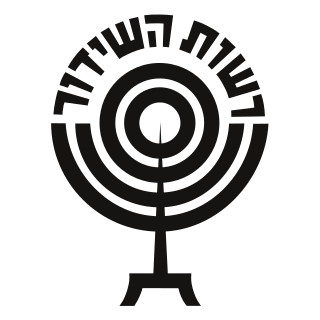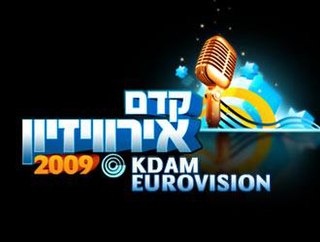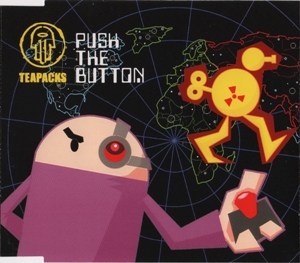
The Israel Broadcasting Authority was Israel's public broadcaster from 1948 to 2017.

Israel has participated in the Eurovision Song Contest 45 times since making its debut in 1973. Israel was able to enter the contest as the Israel Broadcasting Authority (IBA) was an active member of the European Broadcasting Union (EBU), which was responsible for the event. The IBA was succeeded as the broadcaster in charge of the Israeli entry by the Israeli Public Broadcasting Corporation (IPBC/Kan) in 2018. Israel has won the contest four times, and has hosted the contest in Jerusalem in 1979 and 1999, and in Tel Aviv in 2019.
Israel participated in the Eurovision Song Contest 2006 with the song "Together We Are One" written by Orly Burg, Osnat Zabag and Eddie Butler. The song was performed by Eddie Butler, who had previously represented Israel in the Eurovision Song Contest in 1999 as part of the band Eden where they placed fifth with the song "Yom Huledet". The Israeli entry for the 2006 contest in Athens, Greece was selected through the national final Kdam Eurovision 2006, organised by the Israeli broadcaster Israel Broadcasting Authority (IBA). The competition took place on 15 March 2006 and featured eleven entries. "Ze Hazman" performed by Eddie Butler emerged as the winner after achieving the highest score following the combination of votes from four regional juries and a public vote. The song title was later translated from Hebrew to English for the Eurovision Song Contest and was titled "Together We Are One".
Israel participated in the Eurovision Song Contest 2005 with the song "HaSheket SheNish'ar" written by Pini Aaronbayev, Eyal Shachar and Ben Green. The song was performed by Shiri Maimon. The Israeli entry for the 2005 contest in Kyiv, Ukraine was selected through the national final Kdam Eurovision 2005, organised by the Israeli broadcaster Israel Broadcasting Authority (IBA). The competition took place on 2 March 2005 and featured fourteen entries. "HaSheket SheNish'ar" performed by Shiri Maimon emerged as the winner after gaining the most points following the combination of votes from five regional juries and a regional televote.

The Kdam Eurovision in short known as the Kdam was the Israeli national preselection of the Eurovision Song Contest. The competition was first introduced in 1981 and ran until 2014.

Teapacks is an Israeli band that formed in 1988 as HaHotzaa La'Poal in the southern Israeli city of Sderot. Originally the band was named after the correction fluid Tipp-Ex, but in 1995 the transliteration was changed so as not to infringe on the well-known brand, while keeping the pronunciation and spelling in Hebrew the same.

"Push the Button", known in Hebrew as "Kaftor Adom", was the Israeli entry in the Eurovision Song Contest 2007, performed in English, French and Hebrew by Teapacks. This song was the first Israeli entry to feature lyrics in French, as well as the first to feature lyrics in any language aside from Hebrew or English. The entry gained the right to represent the country by an absolute majority, winning 20% of the televote, 20% of the SMS vote, 20% of the pre-vote and 40% of the jury vote. Teapacks had been selected as the Israeli representative by the Israel Broadcasting Authority and invited to perform four songs at the national final to determine which one would be performed in Helsinki.
Israel participated in the Eurovision Song Contest 2008 with the song "The Fire in Your Eyes" written by Dana International and Shay Kerem. The song was performed by Boaz Ma'uda, who was internally selected by the Israeli broadcaster Israel Broadcasting Authority (IBA) in collaboration with the commercial broadcaster Keshet in November 2007 to compete at the 2008 contest in Belgrade, Serbia, The song Ma'uda would perform at Eurovision was selected through the national final Kdam Eurovision 2008 which took place on 15 March 2010 that featured five songs. "Ke'ilu Kan" emerged as the winning song after achieving the highest score following the combination of votes from two regional juries, two thematical jury groups, a jury panel and a public vote. The song title was later translated from Hebrew to English for the Eurovision Song Contest and was titled "The Fire in Your Eyes".
Israel participated in the Eurovision Song Contest 2009 with the song "There Must Be Another Way" written by Noa, Mira Awad and Gil Dor. The song was performed by Noa and Mira Awad, who were internally selected by the Israeli broadcaster Israel Broadcasting Authority (IBA) in January 2009 to compete at the 2009 contest in Moscow, Russia. The song Noa and Awad would perform at Eurovision was selected through the national final Kdam Eurovision 2009 which took place on 2 March 2009 that featured four songs. "Einaiych " emerged as the winning song after achieving the highest score following the combination of votes from two regional juries, a jury panel and a public vote.
Israel participated in the Eurovision Song Contest 2010 with the song "Milim" written by Tomer Hadadi and Noam Horev. The song was performed by Harel Skaat, who was internally selected by the Israeli broadcaster Israel Broadcasting Authority (IBA) in collaboration with the commercial broadcaster Reshet in December 2009 to compete at the 2010 contest in Oslo, Norway. The song Skaat would perform at Eurovision was selected through the national final Kdam Eurovision 2010 which took place on 15 March 2010 that featured four songs. "Milim" emerged as the winning song after achieving the highest score following the combination of votes from four thematical jury groups, a jury panel and a public vote.
Israel participated in the Eurovision Song Contest 2011 with the song "Ding Dong" written and performed by Dana International, who had previously represented Israel in the Eurovision Song Contest in 1998 where she won the contest with the song "Diva". The Israeli entry for the 2011 contest in Düsseldorf, Germany was selected through the national final Kdam Eurovision 2011, organised by the Israeli broadcaster Israel Broadcasting Authority (IBA). The competition took place on 8 March 2011 that featured ten entries. "Ding Dong" performed by Dana International emerged as the winner after achieving the highest score following the combination of votes from three thematical jury groups, a twelve-member jury panel and a public vote.
Israel participated in the Eurovision Song Contest 2004 with the song "Leha'amin" written by David D'Or, Ofer Meiri and Ehud Manor. The song was performed by David D'Or, who was internally selected by the Israeli broadcaster Israel Broadcasting Authority (IBA) to compete at the 2004 contest in Istanbul, Turkey. The song D'Or would perform at Eurovision was selected through the national final Kdam Eurovision 2004 that took place on 5 February 2004 and featured four songs. "Leha'amin" emerged as the winning song after gaining the most points following the combination of a jury vote, an audience vote and a public televote.
Israel participated in the Eurovision Song Contest 2012 with the song "Time" written by Ran Shem-Tov and Shiri Hadar. The song was performed by the band Izabo, which was internally selected by the Israeli broadcaster Israel Broadcasting Authority (IBA) to compete at the 2012 contest in Baku, Azerbaijan. Izabo and the song "Time" were announced as the Israeli entry on 7 February 2012. The song was presented to the public on 1 March 2012.
Israel participated in the Eurovision Song Contest 2013 with the song "Rak Bishvilo" written by Chen Harari and Gal Sarig. The song was performed by Moran Mazor. The Israeli entry for the 2013 contest in Malmö, Sweden was selected through the national final Kdam Eurovision 2013, organised by the Israeli broadcaster Israel Broadcasting Authority (IBA). The five show competition consisting of three semi-finals and a Second Chance round concluded with a final on 7 March 2013 that featured ten entries. "Rak Bishvilo" performed by Moran Mazor emerged as the winner after achieving the highest score following the combination of votes from a seven-member jury panel and a public vote.
Israel participated in the Eurovision Song Contest 2014 with the song "Same Heart" written by Rami Talmid. The song was performed by Mei Finegold, who was internally selected by the Israeli broadcaster Israel Broadcasting Authority (IBA) to compete at the 2014 contest in Copenhagen, Denmark. The song Finegold would perform at Eurovision was selected through the national final Kdam Eurovision 2014 that featured three songs submitted by the public and Finegold herself, which were presented to the public via the release of their official music videos during a show on 27 February 2014. "Same Heart" emerged as the winning song on 5 March 2014 after gaining 55% of the public vote.
Israel participated in the Eurovision Song Contest 2015 with the song "Golden Boy", written by Doron Madali. The song was performed by Nadav Guedj. Israeli broadcaster Israel Broadcasting Authority (IBA) collaborated with the commercial broadcaster Keshet in order to select the Israeli entry for the 2015 contest in Vienna, Austria. The reality singing competition HaKokhav HaBa, which was organised by Keshet, was used to select the artist that would represent Israel. Nadav Guedj emerged as the winner of the competition in a final that took place in February 2015. The song "Golden Boy" was later internally selected as the song Guedj would perform at Eurovision and was presented to the public in March 2015.
Israel participated in the Eurovision Song Contest 2016 with the song "Made of Stars" written by Doron Medalie. The song was performed by Hovi Star. Israeli broadcaster Israel Broadcasting Authority (IBA) collaborated with the commercial broadcaster Keshet in order to select the Israeli entry for the 2016 contest in Stockholm, Sweden. The reality singing competition HaKokhav HaBa L'Eirovizion, which was organised by Keshet and Tedy Productions, was used to select the Israeli entry. The fifteen show competition concluded with a final on 3 March 2016 that featured four performers who were matched with potential Eurovision songs. "Made of Stars" performed by Hovi Star emerged as the winner following a public vote.
Israel was present at the 1987 Eurovision Song Contest, which was held at the Palais du Centenaire in Brussels, Belgium. Their entry was "Shir Habatlanim", written and composed by Zohar Laskov and performed by actor-comedians Natan Datner and Avi Kushnir, who dubbed themselves the Lazy Bums. The song was selected through Israel's traditional national final, the Kdam Eurovision.
Israel participated in the Eurovision Song Contest 2002 with the song "Light a Candle" written by Svika Pick and Yoav Ginai. The song was performed by Sarit Hadad, who was internally selected by the Israeli broadcaster Israel Broadcasting Authority (IBA) in November 2001 to compete at the 2002 contest in Tallinn, Estonia. The song Hadad would perform at Eurovision, "Light a Candle", was also internally selected and presented to the public on 26 February 2002 during the Meni Peer Show which was broadcast on Channel 1.
Israel participated in the Eurovision Song Contest 2003 with the song "Words for Love" written by Yoni Roeh and Yossi Gispan. The song was performed by Lior Narkis who was internally selected by the Israeli broadcaster Israel Broadcasting Authority (IBA) to compete at the 2003 contest in Riga, Latvia. The song Narkis would perform at Eurovision was selected through the national final Kdam Eurovision 2003 that took place on 23 January 2003 and featured four songs. "Milim La'Ahava" emerged as the winning song after gaining the most points following the combination of a jury vote and a public televote. The song was later retitled as "Words for Love".





